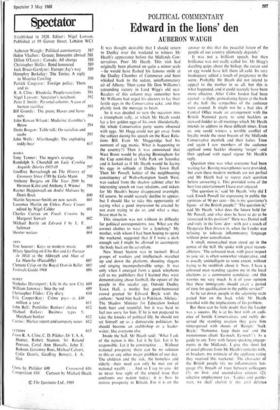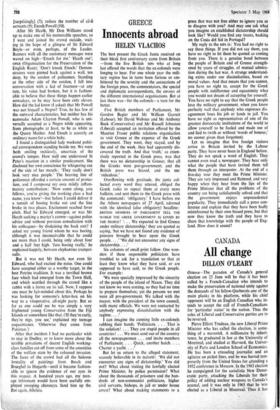Edward in the lions' den
POLITICAL COUMENTARY AUBERON WAUGH
It was thought desirable that I should return to Dudley over the weekend to witness Mr Heath's appearance before the Midlands Con- servatives. Poor Mr Heath. This visit had originally been planned on quite a minor scale —he would have flashed his famous smile at the Dudley Chamber of Commerce and been whisked back to the sedate, uninflammatory air of Albany. Then came Mr Don Williams's astounding victory in Lord Wigg's old seat. Readers of this column may remember how Mr Williams had urged his electors to lay their fertile eggs in the Conservative cake, and they plainly took the message to heart.
So it was decided to turn the occasion into a triumphant rally, at which Mr Heath could lay a few golden eggs of his own. (Incidentally,
the whole Conservative party seems obsessed with eggs. Mr Hogg could not get away from the subject during his speech on the Race Rela- tions Bill. Even Mr Muggeridge had his moment of egg mania. What is happening to the country?) Then it was announced that West Brom would be playing Birmingham for the Cup semi-final at Villa Park on Saturday and it looked as if Mr Heath would be laying his eggs in solitude at Dudley Town Hall. Then Mr Powell, holder of the neighbouring constituency of Wolverhampton South West. was sacked from the shadow cabinet after his interesting speech on race relations, and tickets for Mr Heath's beano disappeared overnight. Of course, he could scarcely decline to appear, but I should like to take this opportunity of saying what a good impression he created by not even trying to do so, and what a nice, brave man he is.
This situation was not without its difficulty for political correspondents, too. What are the correct clothes to wear for a lynching? My mother, with whom I had been hoping to spend the weekend, suggested that if I wore a dark enough suit I might be allowed to accompany the body back on the aeroplane.
New Street Station was in turmoil. Rival groups of workers and intellectuals marched up and down the platform, shouting slogans and singing incomprehensible songs. It was only when I emerged from a quick telephone call to my publishers that I learned they were demonstrating about football, the opium of the people in this secular age. Outside Dudley Town Hall, a motley but good-humoured crowd greeted Sir Edward Boyle with the anthem : 'Send him back to Pakistan, Alleluia.' The Shadow Minister for Education looked both hurt and resentful, but it was hard to feel too sorry for him. If he is not prepared to take the knocks of political life, he should not set himself up as a democratic politician; he should become an archbishop or a leader- writer, like everyone else.
Inside the hall, Mr Heath said : 'What I ask of the nation is this. Let it be fair. Let it be responsible. Let it be constructive . . . Without national prosperity there can be no solution to this or any other major problem of our day. The children and the sick, the homeless and elderly—their need can only be met out of national wealth . . . And so I say.to you—let us never lose sight of the crucial issue that confronts our nation today : it is---how to restore prosperity to Britain. For it is on the answer to this that the peaceful future of the people of our country ultimately depends.'
It was not a brilliant speech, but then brilliance was not really called for. Mr Hogg"s dazzling quips about the bishop, the curate and an egg would have left them all cold. Its very inadequacy added a touch of poignancy to the scene. Probably Mr Heath did not intend to appeal to the mother in us all, but this is what happened, and it could scarcely have been more effective. After Colin Jordan had been ejected—a slight, gesticulating figure at the back of the hall--the sympathies of the audience were assured. It might not be a . bad idea if Central Office made an arrangement with the British National party to send hecklers as. steward-fodder to all meetings which Mr Heath intends to address in these difficult times. Even so, one could witness a terrible conflict of loyalty inside the stout breasts of the Midlands Conservative menfolk and their ladies. Time and again I saw members of the audience applaud some heckler shouting `resign'—and then applaud with equal vigour Mr Heath's reply.
Question time was what everyone had been waiting for. Roving microphones were provided, but even these modern methods are not perfect and Mr Heath had to repeat each question before answering it. This provided some of the best free entertainment I have ever enjoyed.
'The question is,' said Mr Heath, 'why did I sack Enoch Powell for expressing in public the opinions of 90 per cent—this is my questioner's figure—of the British people?' The question is,' said Mr Heath. 'what does the future hold for Mr Powell, and what does he have to do to be reinstated in his position?' Here was Daniel well and truly in the lions' den—with just a touch of Desperate Dan thrown in, when the Leader was refusing to tolerate inflammatory language without prior consultation.
A small, moustached man stood up in the centre of the hall. He spoke with great reason- ableness. 'The coloured man, with great respect to you, sir, is often somewhat vituperative, and is usually unintelligent to some extent, without trying to be snobbish about it. Now. I have a coloured man standing against mc in the local elections as a communist candidate, and this worries me very much. Is it of your opinion that these immigrants should await a period of time for qualification in the public service?'
As he sat down, people in the adjoining seats patted him on the back while Mr Heath wrestled with the implications of his problem.
But there can be little doubt that the Leader was a success. He is at his best with an audi- ence of hostile Conservatives, and richly de- served the standing ovation they gme him (interspersed with shouts of 'Resign,' 'Sack Boyle,"Nonsense, keep them out' and the monotonous chant Te-noch, Ec-noch!'). As a guide to any Tory with future speaking engage- ments in the Midlands. I give this short list of usual phrases from Mr Heath's remarks with, in brackets, my estimate of the applause rating they received this weekend: The character of the British people (4): no inflammatory lan- guage (5); breach of trust between colleagues (5); no first- and second-class citizens (2); selective employment tax—'Ladies and gentle- men, we shall abolish it' (6); civil defence (surprisingly] (7); reduce the number of civil servants (9); Enoch Powell (10).
After Mr Heath, Mr Don Williams stood up to make one of his memorable speeches, so I went and joined the crowd outside, wait- ing in the hope of a glimpse of Sir Edward Boyle—or even, perhaps, of the Leader. Banners with all the customary messages were waved on high—'Enoch for PM.' Heath out'; OPER (Organisation for the Preservation of the English Race); 'Don't knock Enoch.' Demon- strators were pinned back against a wall, ten. deep, by the cordon of policemen Standing at the other side of the cordon, I fell into conversation with a lad of fourteen—at any rate, his voice had broken, but it is fashion- able to believe that these things happen earlier nowadays, so he may have been only eleven. How did the lad know (I asked) that Mr Powell was not himself a Negro? True, he has few of the outward characteristics, but neither has his namesake Adam Clayton Powell, who is uni- versally accepted as a Negro while appearing, from photographs at least, to be as white as the Queen Mother. And Enoch is scarcely an ordinary name for a white baby.
I found a distinguished lady weekend politi- cal correspondent standing beside me. We were both smiling recklessly, uncertain of the crowd's temper. How well one understood St Peter's reaction in a similar predicament. She disclosed her own conscience by whispering out of the side of her mouth: 'They really don't look very nice people.' The heaving line of policemen afforded a certain amount of protec- tion, and I composed my own mildly inflam- matory contribution: 'Now come along, you fellows, you're giving the working class a bad name, you know'—but before I could deliver it a tumult of booing broke out and the line broke in two places. Excitement reached fever pitch. Had Sir Edward emerged, or was Mr Heath seeking a martyr's crown—against police advice and without previous consultation with his colleagues—by disdaining the back exit? I asked my young friend whom he was booing, although it was inconceivable that he could see more than I could, being only about four and a half feet high. 'Just- booing really,' be explained happily, between elephantine trumpet- calls.
But it was not Mr Heath, nor even Sir Edward, who had excited the noise. One could have accepted either as a worthy target, in the best Petrine tradition. It was a terrified brown face which had emerged from the Town Hall, and which scuttled through the crowd like a rabbit with a ferret on its tail. Now, I suppose one must be fair-minded about this. Perhaps he was looking for someone's letter-box on his way to a vituperative, all-night party. But so far as one could see he was simply a very frightened young Conservative from the Fiji Islands or somewhere like that. (If they're curly, they're nigs, you see,' explained my teenage acquaintance. 'Otherwise they come from Pakistan.) After that incident I had no particular wish to stay in Dudley, or to know more about the terrible privations of decent English working- class families cut off from some of the amenities of the welfare state by the coloured invasion.
The faces of the crowd had all the hideous brutality of paintings from Bosch and Brueghel to Hogarth—until it became fashion- able to ignore the evidence of our eyes in this respect. A hundred years ago, my teen- age informant would have been usefully em- ployed sweeping chimneys. Send him up the flue again, Alleluia.







































 Previous page
Previous page